Patients today want healthcare services to be personalized, accurate, swift, and accessible digitally. As tech-savviness increases among people, patients’ expectations toward digital healthcare services are rising. In fact, a survey reveals,
56% of patients demand digital options for managing their health.
Not only patients, but healthcare professionals also believe that healthcare software development can improve patient care and streamline healthcare operations and patient outcomes. As per the same survey,
69% of providers agree that mobile health access is important to patients.
But what does healthcare software development actually mean? Are there any benefits? What is the role of emerging technologies like AI, IoT, ML, etc., in healthcare software development? If you want to explore the uncharted realm of digital healthcare, this is your starting point.
So, consider this guide as an index to know everything about healthcare software development and how you can drive successful digital transformation in healthcare.
Let’s get rolling, then!
What is Healthcare Software Development? And how does it benefit the healthcare industry?
Healthcare software development is the digital alchemy of crafting apps and systems that revolutionize healthcare. It is a tech-driven process of creating software solutions that can help improve patient care, enhance clinical and administrative workflow, and reduce healthcare costs.
Healthcare software includes, for example, electronic healthcare records (EHRs), telemedicine platforms, diagnostic algorithms, patient management systems, and more. While serving different purposes, these software applications work towards making healthcare accessible, streamlining medical processes, and safeguarding sensitive health data.
Call it faith in healthcare technology trends or FOMO, but venture capitalists invested about $3.4 billion across 132 deals in the U.S. digital health in Q1 2023. What is it that investors see as worth billions in healthcare software development?
Not only investors but healthcare software development has in store something for everyone involved. For example,
Patients: Improved access to healthcare, personalized treatment plans, and enhanced communication with providers.
Healthcare Providers: More efficient patient management, accurate diagnostics, and streamlined administrative processes.
Healthcare Organizations: Better data management, reduced operational costs, and compliance with regulatory standards.
Developers: Opportunities for innovation in a vital and rapidly evolving industry.
Investors: Potential for significant returns in a high-growth sector.
Now, if you plan to invest in healthcare software, you must understand what type of healthcare software you want to develop. You can leverage Healthcare IT consulting services offered by software companies to find a suitable solution for your needs.
Most Popular Types of Healthcare Software Solutions
From the definition of healthcare software development, you can imagine that you can build software literally for any aspect of healthcare— to streamline the recording of patient data, track fitness on the go, monitor patient condition remotely, etc. However, that is subject to custom healthcare software development (will discuss it ahead).
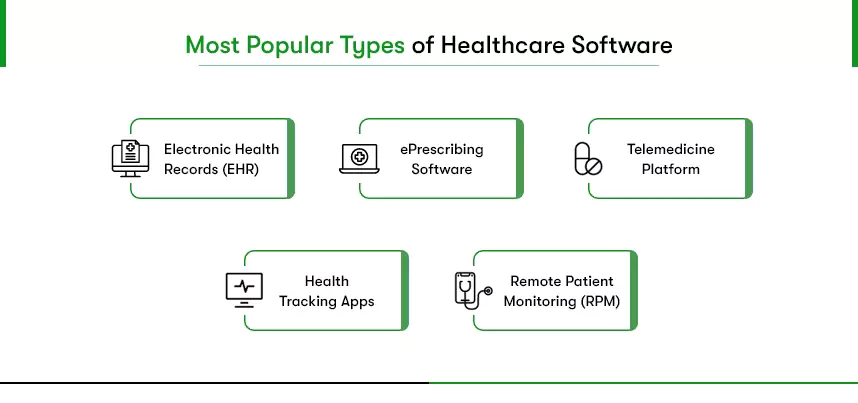
For now, let’s discuss top healthcare software solutions.
Electronic Healthcare Records (EHRs)
EHRs are digital records that centralize patient data, including medical history, treatment plans, and test results. Features like real-time updates and integrated lab results make them indispensable. For example, Epic Systems provides a comprehensive EHR system widely used in hospitals, enhancing patient care and data accuracy.
ePrescribing Software
Streamlining the prescription process, ePrescribing software reduces errors and improves medication adherence. Features like drug interaction checks set them apart. Think of Surescripts, which offers a networked system for secure electronic prescribing.
Telemedicine Software
Offering remote consultations, telemedicine bridges the gap between patients and healthcare providers. For example, Teladoc is a telemedicine platform that offers video consultations, appointment scheduling, and electronic prescriptions, making healthcare more accessible.
Health Tracking Apps
These apps empower patients to monitor their health metrics, like heart rate or step count. Fitbit, for instance, provides a user-friendly interface for tracking fitness and wellness goals, promoting proactive health management.
Remote Patient Monitoring
This technology enables continuous monitoring of patient’s health conditions remotely. Systems like Philips eCareCoordinator are apt examples that offer real-time data monitoring, alerting healthcare providers to potential issues and thus preventing complications.
So, what if you want to create your own healthcare software different from the ones mentioned above? Custom healthcare software development is the answer!
Why opt for Custom Healthcare Software Development?
Custom healthcare software development goes beyond just adopting technology; it’s about investing in solutions that resonate with your unique operational ethos and patient-care philosophy.
With expert healthcare software developers, you can invent a solution that’s effective and empathetic to the needs of your patients and staff. That’s not all. Custom healthcare software can benefit you in many ways, such as,
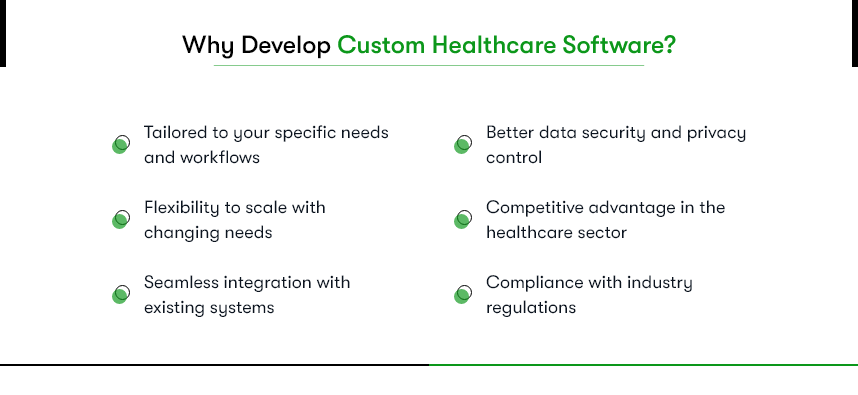
Tailored to Unique Needs: Every healthcare organization has its specific challenges and requirements. Custom healthcare software development allows for solutions that are tailor-made to address these unique needs, be it for a hospital, a small clinic, or an elder healthcare app solution.
Scalability and Flexibility: As your healthcare organization grows, so do your IT needs. Custom solutions offer the flexibility to scale up or modify features as per evolving demands, something off-the-shelf software often falls short of.
Integration with Existing Systems: One of the biggest challenges in adopting new technology is ensuring it works seamlessly with existing systems. Custom software can be designed to integrate smoothly with your current infrastructure, enhancing overall efficiency.
Enhanced Security: When it comes to healthcare, security is non-negotiable. Custom software development allows for robust, tailor-made security features, safeguarding sensitive patient data more effectively than generic solutions.
Competitive Advantage: In a field as competitive as healthcare, staying ahead means leveraging technology that sets you apart. Custom solutions enable you to gain a competitive edge. Be it IoT, AI, ML, wearables, or data analytics, you can integrate the latest tech trends as you like.
For example, make an AI skincare app or clinical support system with predictive analytics and provide personalized treatment for each patient.

The Role of Information Technology in Healthcare Software
Healthcare has always been at the forefront of adopting emerging technologies. Many of the changes that we are seeing today are a result of technology implementation—for example, wearable devices to monitor patients’ vitals and detect health issues early.
So, what technologies should you embrace today in your healthcare software to make healthcare better and more efficient tomorrow? Let’s find out!
Artificial Intelligence in Healthcare Software
AI algorithms have the potential to assist medical staff and professionals in providing personalized patient service and 24/7 support. Furthermore, AI enhances diagnostic precision, reduces human error, and speeds up treatment.
That’s why AI is being used in diagnosing diseases, such as cancer, more accurately and quickly than ever before. For instance, Google Health has shown that AI can detect breast cancer as accurately as clinical experts. One study found that AI-supported mammogram screening increased breast cancer detection by 20%.
Integration of NLP in Healthcare Software
NLP, a branch of artificial intelligence, is revolutionizing healthcare by interpreting and analyzing patient data from various sources. NLP is a technique of extracting information from unstructured data such as text, speech, and images. With Natural Language Processing, healthcare providers can gain deeper insights into patient conditions and ensure effective, personalized treatments.
For example, NLP algorithms can automatically sort through patient records to identify trends or risk factors, significantly reducing the time and effort required for data analysis. Get a detailed analysis of NLP in healthcare in our comprehensive guide.
Predictive Analytics in Healthcare Software
Predictive analytics use historical data, statistical algorithms, and machine learning techniques to identify the likelihood of future outcomes. In healthcare, this means predicting patient risks, disease outbreaks, or resource needs. By anticipating future events, healthcare providers can proactively manage care, allocate resources more efficiently, and improve patient outcomes.
For instance, predictive analytics can forecast patient admissions, helping hospitals manage staffing and bed availability. That’s not all. Venture into the roles of Predictive Analytics in Healthcare to make your healthcare software agile.
Augmented Reality in Healthcare Software
AR provides real-time data and visuals to surgeons, enhancing the accuracy of procedures. It also offers immersive remote healthcare guidance as well as training experiences for medical students.
In addition to medical training, Augmented Reality helps visualize veins for blood collection and track the patient’s healing process. For example, AR headsets can overlay CT scans onto a patient’s body during surgery for precise incisions.
Flutter Cross-platform Framework
Before you start wondering what makes Flutter worthy of joining the list, let me tell you that it can save tons of time, effort, and cost. How? Flutter is an open-source mobile app development framework that enables iOS and Android app development from a single codebase.
For example, you want to build a telemedicine app like Teladoc for all Android and iPhone users. But you cannot afford to develop two different apps. In that case, hiring Flutter developers would be enough. But why Flutter? Because it offers,
- Cross-platform development
- Single codebase for iOS and Android
- Time and Cost efficiency
- Rich set of customizable widgets
- Visually appealing user interfaces
- Hot Reload feature for real-time updates
- Consistent performance on different devices
After understanding types of healthcare software, why custom development, and what technologies to use to stand out, we’ve arrived at a vital question.
The Role of Healthcare Software Developers
If you want to navigate the digital healthcare landscape, you must have a team of expert developers. Experienced developers not only program the software but also help you craft innovative healthcare solutions out of futuristic technology.
You wouldn’t want rookie developers to build your healthcare software that crashes every now and then. That would make patients question whether their data is safe in your healthcare software.
So, besides leveraging technology, investing in hiring experienced developers assures your healthcare software is compliant, secure, and user-friendly. But how do you identify the right developers for your healthcare software development? Here’s the checklist you can rely on.
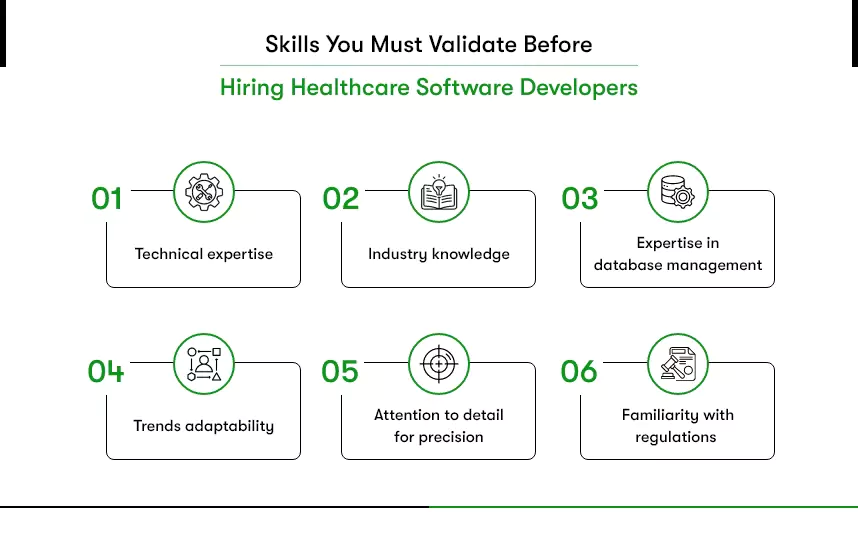
Technical Expertise
Proficiency in key programming languages (Python, Java, C#, JavaScript)
Experience in mobile app development, especially with Flutter
Knowledge in database management (SQL, NoSQL)
Familiarity with cloud computing platforms (AWS, Azure, Google Cloud)
Healthcare Industry Knowledge
Understanding of healthcare regulations (e.g., HIPAA)
Experience with Electronic Health Records (EHR) systems integration
Data Security and Privacy
Expertise in cybersecurity and patient data protection
Knowledge of encryption and secure data transmission
Interoperability Skills
Ability to integrate various healthcare systems (EHR, Laboratory Information System, Clinical Decision Support System)
Skills in enabling seamless data exchange between different platforms
Adaptability and Continuous Learning
Eagerness to keep up with healthcare IT advancements
Flexibility to adapt to new technologies and practices
User-Centered Design
Experience in designing intuitive and user-friendly interfaces
Ability to conduct user testing and incorporate feedback
How much does Healthcare Software Development Cost?
Navigating the costs of healthcare app development can often feel like a tightrope walk for healthcare professionals. Balancing the financial realities with the aspiration to offer cutting-edge patient care is no small feat.
On average, custom healthcare software development can range from $50,000 to $200,000 or more.
The cost of developing healthcare apps is multifaceted. It includes design, development, testing, integration, and maintenance expenses. But what factors influence these costs?
App Complexity: The more complex the app, the higher the development cost.
Technology Used: Advanced technologies like AI or blockchain can increase costs.
Design and User Experience: A well-designed, intuitive interface may cost more but is crucial for user engagement.
Post-launch Services: Ongoing support, updates, and maintenance add to the overall expense.
Functionality: More features and integrations mean higher costs.
Number of Platforms: Developing for multiple platforms (iOS, Android, web) increases development time and cost.
Furthermore, compliance with healthcare regulations and choosing between in-house or outsourced healthcare software developers play a significant role.
However, you must weigh these costs against the potential benefits of healthcare software development. How will the software streamline operations? Will it enhance patient care? These questions are vital when considering the budget for software development for healthcare.
The Return On Investment can be realized through improved operational efficiency, enhanced patient care, streamlined workflows, reduced error rates, better data management, and compliance adherence. Additionally, cost savings can be achieved through automation, reduced paperwork, and optimized resource allocation.
So, conducting a thorough cost-benefit analysis is crucial to determine the long-term value and potential ROI of healthcare software development. This analysis should consider not only the immediate financial impact but also the broader operational and strategic benefits that the software is expected to deliver over time.
Build Your Custom Healthcare Software with Industry Experts!
Do you feel confident to start your healthcare software development project? Well, it is understandable. It is a complex and detailed process. Healthcare software development requires much planning, investment, and expert guidance.
As a leading expert in healthcare software development, Kody Technolab is primed to lead your custom healthcare software project. Our team combines deep industry knowledge, technical expertise, and a data security and privacy commitment, ensuring a tailored solution that meets your unique needs.
With a focus on adaptability and continuous learning, we are well-prepared to guide you through this complex and detailed process, providing expert guidance every step of the way.

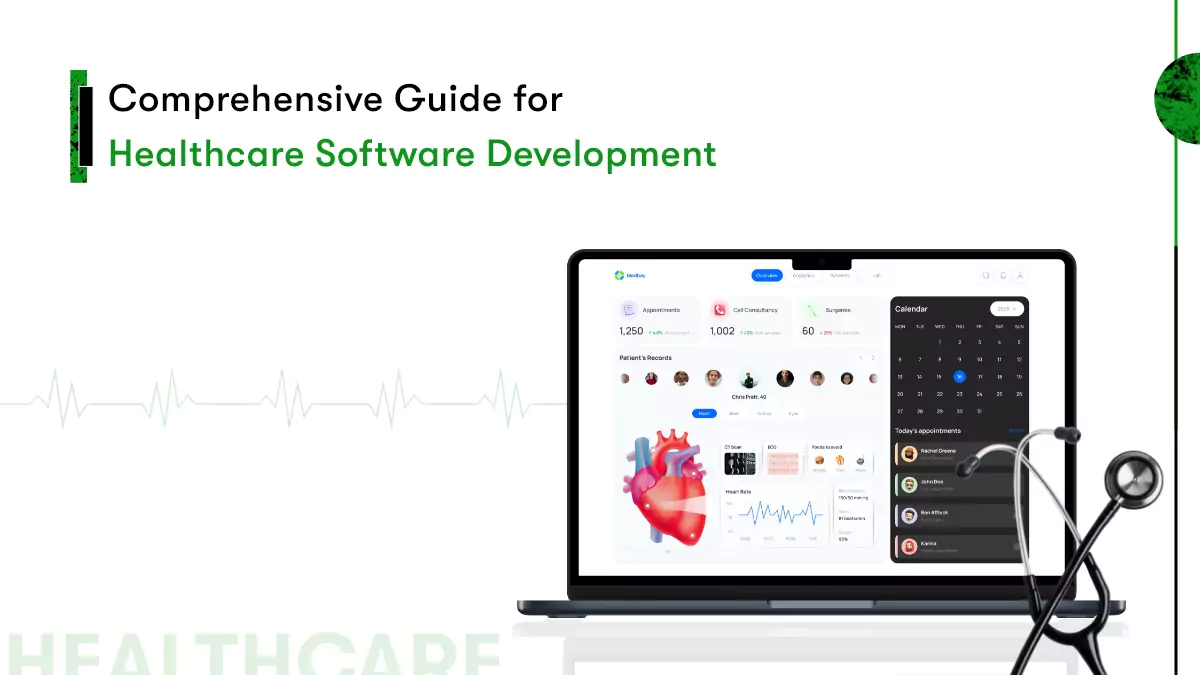
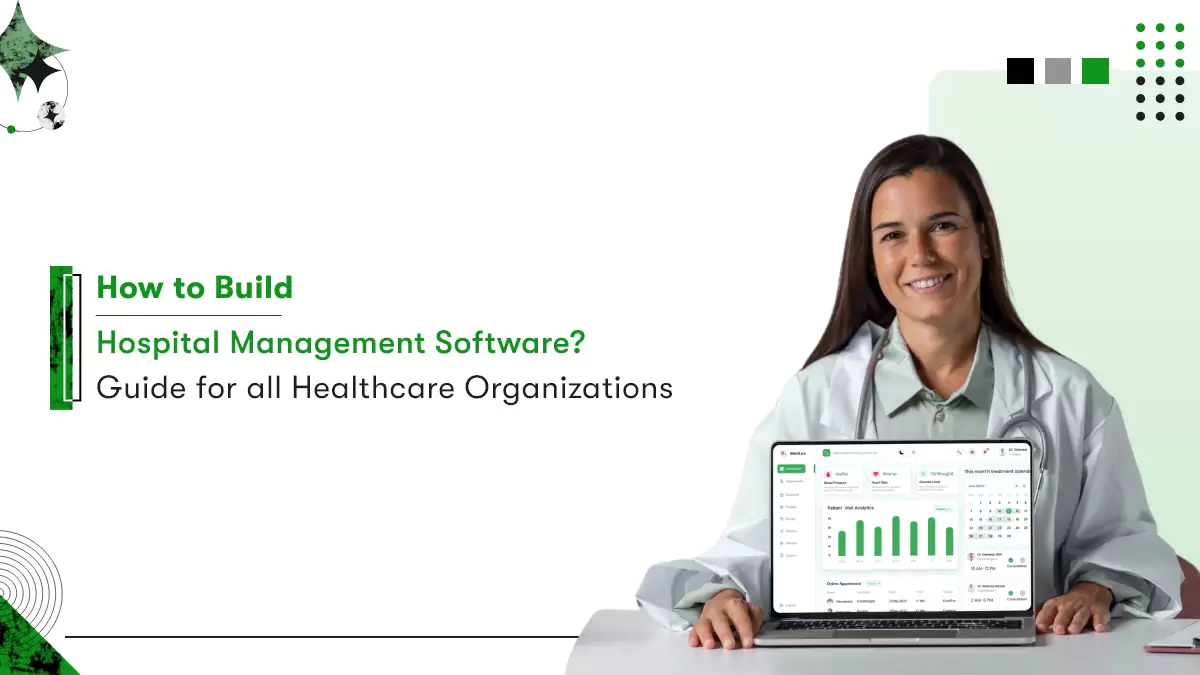
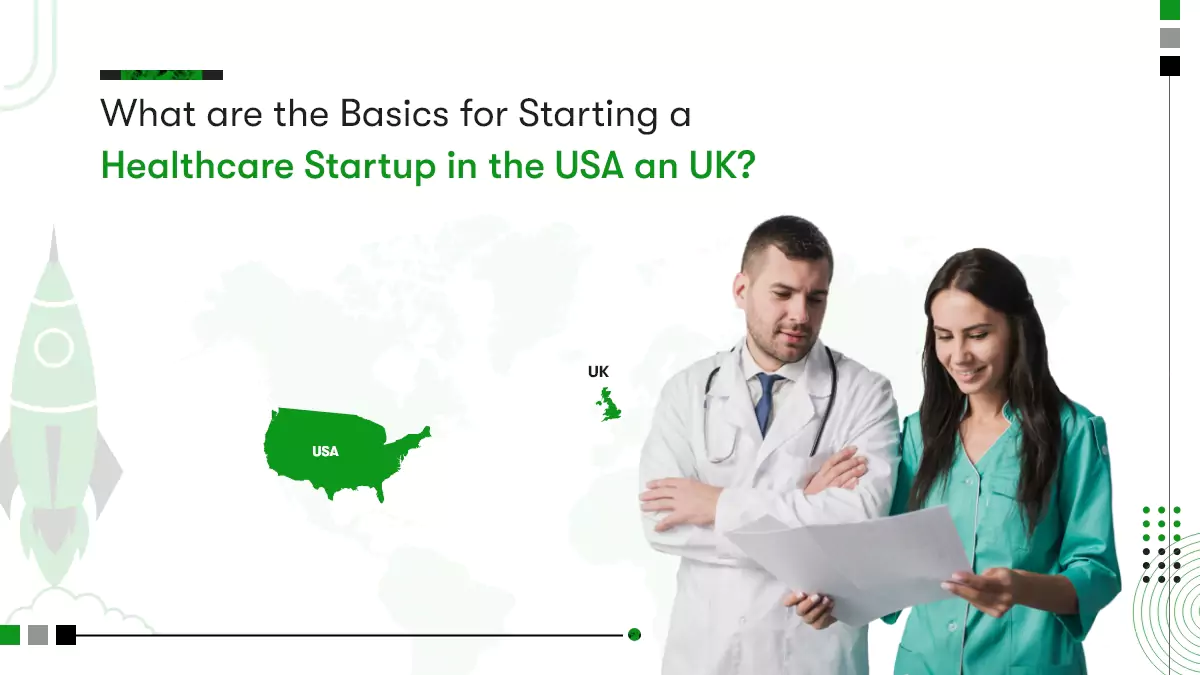
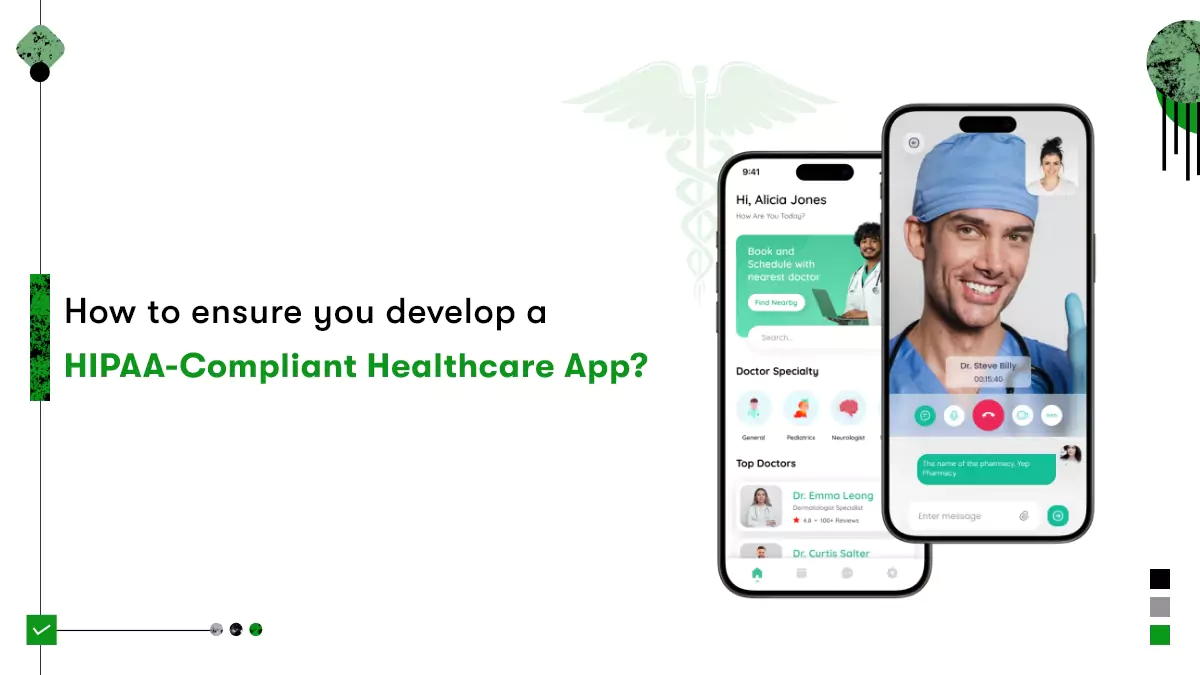
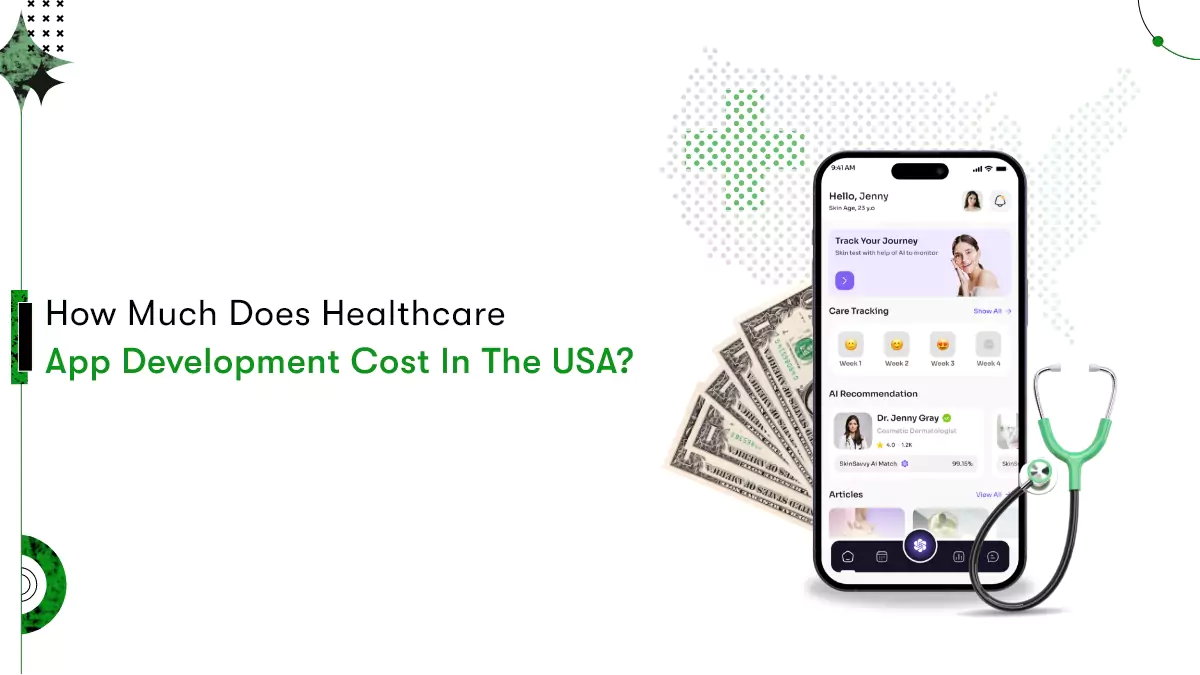
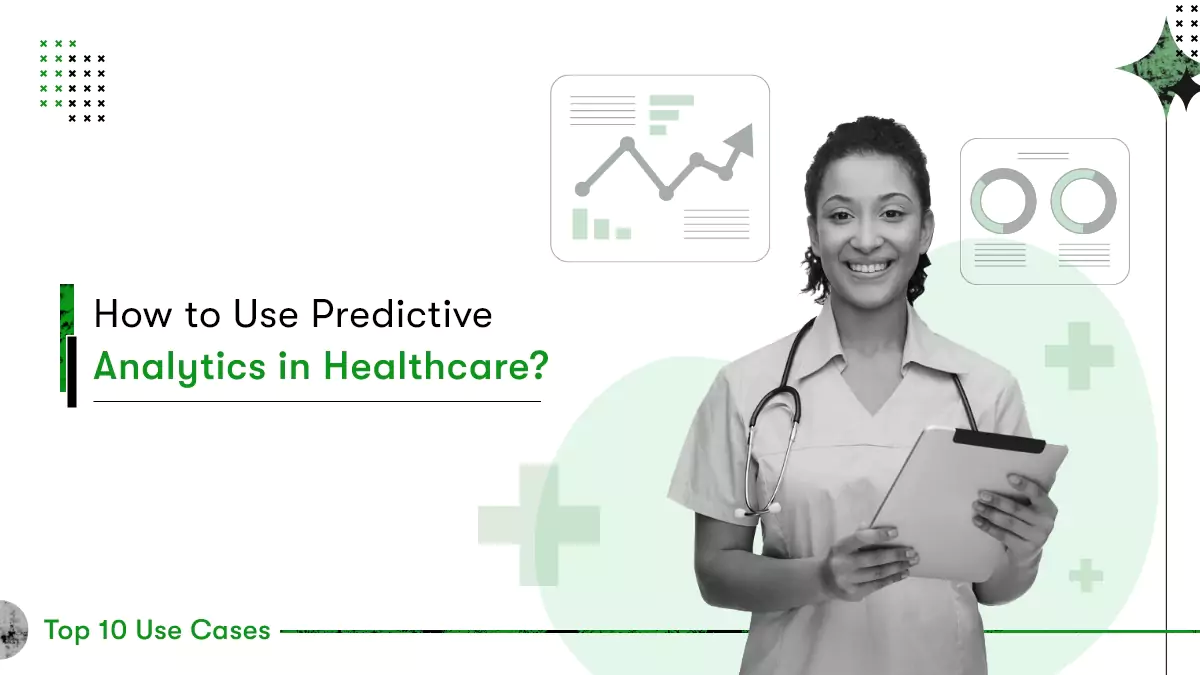





 Contact Information
Contact Information